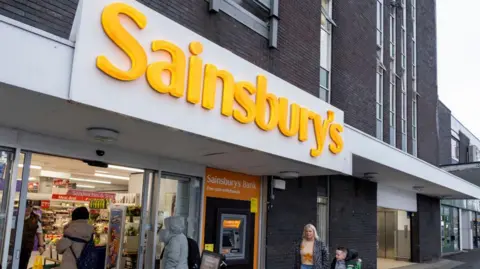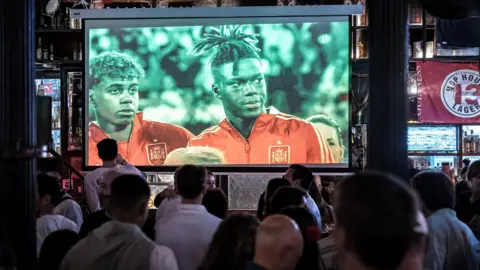Sainsbury's hit as wet weather dampens Argos sales
 Getty Images
Getty ImagesSainsbury's has reported a slowdown in sales after the soggy spring weather hit trading at its Argos business.
The UK's second largest supermarket said it had seen strong food sales, but the wet weather hit demand for garden equipment and outdoor furniture at Argos.
Cost of living pressures also hit non-food sales, and Sainsbury's boss Simon Roberts said he expected consumers to remain cautious until interest rates start to fall.
One analyst suggested the Argos business was an "albatross" around the supermarket's neck.
Sales overall were up 3% in the 16 weeks to 22 June, Sainsbury's said, but this was slower than in the previous quarter.
Food sales rise 4.8%, with Nectar offers and Aldi price matching helping to attract shoppers.
Sainsbury's also said its 'Taste the Difference' premium own brand range had seen sales jump by 14%.
However, sales of non-food items were down and Argos saw sales drop 6.2%. Along with the wet weather, the retailer said cost-of-living pressures meant shoppers were still cautious about spending on big ticket items.
Argos also saw weaker demand for consumer electronics, particularly in gaming.
Mr Roberts said it was not surprising that consumers were being cautious given the pressure on household finances and he did not expect this to change until there were "sequential" cuts in interest rates.
However, he added that the weather was a key factor in how and when customers choose to spend. The recent spell of hot weather had triggered a spike in sales of items such as fans and paddling pools.
Sophie Lund-Yates, lead equity analyst at Hargreaves Lansdown, said "the Argos albatross around its [Sainsbury's] neck can’t be ignored".
"Electronics aren’t faring well in this economic climate, as people prioritise the essentials," Ms Lund-Yates said.
"General merchandise is the most cyclical area of the supermarket economy to be in, so being overweight in this arena really slows you down when times get tough.
"The additional exposure offsets and hides what has been a remarkable showing for the core grocery business."
Russ Mould, investment director at AJ Bell, said that Sainsbury’s has "the same nagging feeling as the England football team - it eventually scores a goal but you know it could do a lot better".
“The non-food operations have been letting the side down for a long time and causing unwelcome distractions for management when they could be doing even more to capitalise on the new-found strength in food."
 Getty Images
Getty ImagesSeparately, research from the British Retail Consortium (BRC) found that cheaper coffee, butter and TVs all helped to slow shop price rises to the lowest annual rate for almost three years last month.
Prices rose at an annual rate of 0.2% in June, the BRC said, with TVs being discounted ahead of the Euro 2024 tournament.
Inflation - the rate at which prices rise - has been falling steadily over the past year.
However, even though inflation is falling, it does not mean the prices of goods and services overall are coming down, just that they are rising at a slower pace.
While the BRC survey found shop price rises have slowed to the lowest rate since October 2021, many food items and other goods are still more expensive than they were before the pandemic and Russia's invasion of Ukraine, leaving household budgets squeezed.
